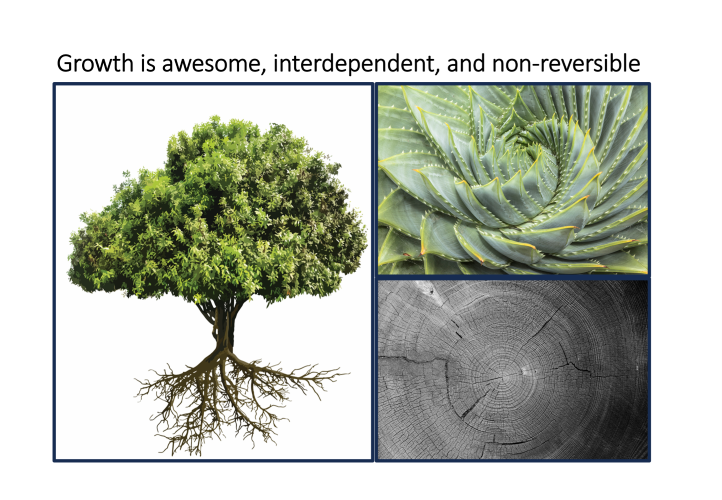US Economic Policies are Naturally Fractal and Not Retractable
In the United States, one president is preparing to leave, while the next one is preparing to take over. With each presidential transition, there are plans to dismantle policies created during one administration so life will return to better days. This is not the way economic policies work.
Economic policies grow like living things. In other words, they change over time based on activities and choices made at an earlier time. They are dependent on an evolutionary history. Statistically, these policies are non-random, time-series events. Like the biology of nature, economic policies are naturally fractal.
Growing biological plants repeat similar patterns as they grow. Trunks become roots and branches, which in turn, branch out. At the ends of branches and roots more fibers branch out and create leaves and root hairs. Even within each of these there is a symmetry of expansion.
When part, or whole, of a branch or root are removed from a tree, the tree does not return to where it was previously, before the branch or root existed. The entire life form compensates for the missing part.
Economic policies are similar in this manner. They can be changed, added, or removed, but the economic organism does not return to the good old days.
In Mr. Trump’s first term, a high priority was removing the Affordable Care Act. It did not happen, at least as anticipated. Mr. Trump’s import tariffs, particularly against China, not only remained, but increased in some cases under Mr. Biden.
A November 30, 2024 Wall Street Journal (WSJ) article explores the challenges of removing the Inflation Reduction Act. It is easier to think about returning to the good old days of simply producing more oil and coal, than it is to do it. The WSJ article points out that many in favor of Mr. Trump’s campaign promises will lose significant business opportunities if current policies are revoked.
In undergraduate economics, texts discuss an economic ‘change while keeping other factors the same.’ It is important to discuss introductory economics in those terms because it helps understand the characteristics of each term. However, economics happens in the reality of chaos. In the daily changes that take place, it is not possible to keep anything the same. Any 2-dimensional chart only tracks 2 factors, often one of them is time.
Looking backwards, it is easier to draw conclusions about the relative impact of this factor, or that factor.
Looking forwards, it is a far different story. How does cryptocurrency impact money supply and employment, when by design, there is little data collected? How much do artificial increases in domestic prices protect national interests? Enough to increase inflation? Much of the Inflation Reduction Act is going into investment in infrastructure. This rebuilding/expansion of our nation’s roads, rails, broadband access is long overdue. It allows the US to be both globally and domestically competitive.
The inaugural Biomass Rules blog chronicled the 50-year transformation of methane emissions from a costly liability to revenue generating economic resource. Today’s premium renewable natural gas (RNG) prices were created from attempts to comply with the Clean Water, Clean Air, and Resource Conservation and Recovery Act of the 1970s. The codified externalities of waste creation are moving into a new era of cost-effective utilization offsetting traditional fossil fuels. Similarly, the US uses more recycled paper today as commercial paper than it uses of paper made from virgin stocks. We are powering the paper economy on materials that 50 years ago were trash.
The education received by the planets’ billions cannot be unlearned. We can only go forward. Even the recent reversal of the Roe vs. Wade decision did not take us back to 1973. The laws were not perfect before that decision, nor after. Overturning that decision in 2022 did not fix the problem. It only cut off a branch. New policy branches are forming even as more branches are pruning. It is clear though. The US is not returning to 1973.
I often told my undergraduate students in economics that the 11 billion tons of waste in place in the 600 US landfill gas project landfills, AND the challenges the United States has with immigration, were my generations gift to their generation.
The economy is moving at 24,000 miles per hour. Choosing to allow the government, or the largest private companies, to solve all our problems is not paying attention. As citizens of the economy, we do not argue about the policies that are working. We fight and become passionate about policies that are not working. Building for tomorrow requires each of us to build, not feed on, the tremendous foundation that is the United States economy.
Existing branches of the tree must be shaped for greater growth, not pruned with abandon. The most effective future policies will build on yesterday’s successes. Even as calls are made to retract certain policies, there is no going back. We can only go forward.



Comments
US Economic Policies are Naturally Fractal and Not Retractable — No Comments
HTML tags allowed in your comment: <a href="" title=""> <abbr title=""> <acronym title=""> <b> <blockquote cite=""> <cite> <code> <del datetime=""> <em> <i> <q cite=""> <s> <strike> <strong>